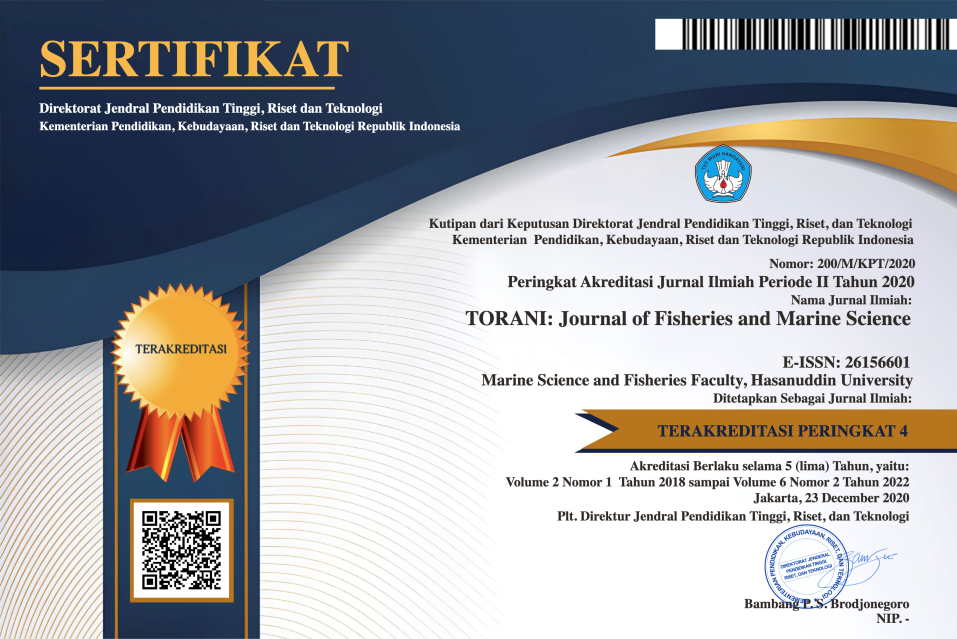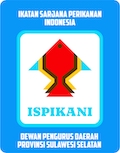Author Guidelines Peer Review Reviewers Focus and Scope Publication Ethics Copyright Notice Author(s) Fee Plagiarism Policy
About the Journal
Focus and Scope
This journal is an academic, citation indexed, and blind peer-reviewed journal. It covers original research articles, short notes and communications, reviews (including book), concepts, commentaries, and letters on a diverse topic related to fishery and marine sciences.
The aim of this journal is to provide a venue for academicians, researchers, and practitioners to share/discuss theories, views, research results, on issues related to the science, engineering and technology, and humanities in fisheries and marine development, management, and issues in fisheries and marine systems particularly in aquaculture, fishery resource, fish food processing, marine fisheries, fishery agribusiness.
Peer Review Process
Each submitted manuscript is assessed based on the following rules:
- the authenticity of its contribution to the field of scientific publishing
- in the methodology and theory took according to the topic
- coherence analysis
- grammar and writing by existing provisions
Open Access Policy
This journal provides immediate open access to its content on the principle that making research freely available to the public supports a greater global exchange of knowledge.
Peer Review Process
Torani Journal of Fisheries and Marine Science published the only paper strictly following TORANI guidelines and template for preparation manuscript. All submitted manuscripts are going through a double-blind peer-review process. Those papers are read by editorial members (upon the field of specialization) and will be screened by Managing Editor to meet the necessary criteria of TORANI publication. Manuscripts will be sent to two reviewers based on their historical experience in reviewing manuscripts or based on their field of specialization. TORANI has reviewing forms in order to keep the same items reviewed by two reviewers. Then editorial board makes a decision upon the reviewers' comments or advice. Reviewers give their assessment on originality, clarity of presentation, contribution to the field/science, TORANI has three kinds of decisions:
- Accepted, as it is
- Accepted by Minor Revisions (let authors revised with stipulated time)
- Accepted by Major Revisions (let authors revised with stipulated time)
- Rejected (generally, on grounds of the outside of scope and aim, major technical description problems, lack of clarity of presentation)
For checking Plagiarism, TORANI Editorial Board will screen plagiarism by using Plagiarism Checker X Program. If it is found plagiarism indication (above 30%), the editorial board will reject the manuscript immediately.
Before publishing, it is required to obtain written confirmation from authors in order to acquire copyrights for papers published in the journal. Authors must sign the Copy Right Transfer Form (Downloadable) as follows: The undersigned hereby transfer any and all rights in and to the paper including without limitation all copyrights to Torani Journal. The undersigned hereby represents and warrants that the paper is original and that he/she is the author of the paper, except for material that is clearly identified as to its original source, with permission notices from the copyright owners where required. The undersigned represents that he/she has the power and authority to make and execute this assignment. This agreement is to be signed by at least one of the authors who have obtained the assent of the co-author(s) where applicable.
Publication Ethics
Torani Journal of Fisheries and Marine Science is a peer-reviewed electronic national journal. This statement clarifies the ethical behavior of all parties involved in the act of publishing an article in this journal, including the author, the chief editor, the Editorial Board, the Peer-reviewer and the Publisher (Marine Science and Fisheries Faculty, Hasanuddin University). This statement is based on COPE’s Best Practice Guidelines for Journal Editors.
Download: PUBLICATION ETHICS AND TRANSFER OF COPYRIGHT
Ethical Guideline for Journal Publication
The publication of an article in TORANI is an essential building block in the development of a coherent and respected network of knowledge. It is a direct reflection of the quality of the work of the authors and the institutions that support them. Peer-reviewed articles support and embody the scientific method. It is therefore important to agree upon standards of expected ethical behavior for all parties involved in the act of publishing: the author, the journal editor, the peer reviewer, the publisher, and the society.
Marine Science and Fisheries Faculty, Hasanuddin University as the publisher of Torani Journal of Fisheries and Marine Science takes its duties of guardianship over all stages of publishing extremely seriously, and we recognize our ethical and other responsibilities. We are committed to ensuring that advertising, reprint, or other commercial revenue has no impact or influence on editorial decisions. In addition, Marine Science and Fisheries Faculty, Hasanuddin University, and Editorial Board will assist in communications with other journals and/or publishers where this is useful and necessary.
Publication decisions
The editor of the Torani Journal of Fisheries and Marine Science is responsible for deciding which of the articles submitted to the journal should be published. The validation of the work in question and its importance to researchers and readers must always drive such decisions. The editors may be guided by the policies of the journal's editorial board and constrained by such legal requirements as shall then be in force regarding libel, copyright infringement, and plagiarism. The editors may confer with other editors or reviewers in making this decision.
Fair play
The editor at any time evaluates manuscripts for their intellectual content without regard to race, gender, sexual orientation, religious belief, ethnic origin, citizenship, or political philosophy of the authors.
Confidentiality
The editor and any editorial staff must not disclose any information about a submitted manuscript to anyone other than the corresponding author, reviewers, potential reviewers, other editorial advisers, and the publisher, as appropriate.
Disclosure and conflicts of interest
Unpublished materials disclosed in a submitted manuscript must not be used in an editor's own research without the express written consent of the author.
Duties of Editors
The editor is responsible for deciding which of the articles submitted to the journal should be published. The validation of the work in question and its importance to researchers and readers must always drive such decisions. The editors may be guided by the policies of the journal's editorial board and constrained by such legal requirements as shall then be in force regarding libel, copyright infringement, and plagiarism. The editors may confer with other editors or reviewers in making this decision.
Fair play
The editor at any time evaluates manuscripts for their intellectual content without regard to race, gender, sexual orientation, religious belief, ethnic origin, citizenship, or political philosophy of the authors.
Confidentiality
The editor and any editorial staff must not disclose any information about a submitted manuscript to anyone other than the corresponding author, reviewers, potential reviewers, other editorial advisers, and the publisher, as appropriate.
Disclosure and conflicts of interest
Unpublished materials disclosed in a submitted manuscript must not be used in an editor's own research without the express written consent of the author.
Duties of Reviewers
Contribution to Editorial Decisions
Peer review assists the editor in making editorial decisions, and through the editorial communications with the author may also assist the author in improving the paper.
Promptness
Any selected referee who feels unqualified to review the research reported in a manuscript or knows that its prompt review will be impossible should notify the editor and excuse himself from the review process.
Confidentiality
Any manuscripts received for review must be treated as confidential documents. They must not be shown to or discussed with others except as authorized by the editor.
Standards of Objectivity
Reviews should be conducted objectively. Personal criticism of the author is inappropriate. Referees should express their views clearly with supporting arguments.
Acknowledgment of Sources
Reviewers should identify relevant published work that has not been cited by the authors. Any statement that an observation, derivation, or argument had been previously reported should be accompanied by the relevant citation. A reviewer should also call to the editor's attention any substantial similarity or overlap between the manuscript under consideration and any other published paper of which they have personal knowledge.
Disclosure and Conflict of Interest
Privileged information or ideas obtained through peer review must be kept confidential and not used for personal advantage. Reviewers should not consider manuscripts in which they have conflicts of interest resulting from competitive, collaborative, or other relationships or connections with any of the authors, companies, or institutions connected to the papers.
Duties of Authors
Reporting standards
Authors of reports of original research should present an accurate account of the work performed as well as an objective discussion of its significance. Underlying data should be represented accurately in the paper. A paper should contain sufficient detail and references to permit others to replicate the work. Fraudulent or knowingly inaccurate statements constitute unethical behaviour and are unacceptable.
Data Access and Retention
Authors can be asked to provide the raw data in connection with a paper for editorial review, and should be prepared to provide public access to such data (consistent with the ALPSP-STM Statement on Data and Databases), if practicable, and should in any event, be prepared to retain such data for a reasonable time after publication.
Originality and Plagiarism
The authors should guarantee that they have written entirely original works and if the authors have used the work and/or words of others that this has been appropriately cited or quoted.
Multiple, Redundant or Concurrent Publication
An author should not in general publish manuscripts describing essentially the same research in more than one journal or primary publication. Submitting the same manuscript to more than one journal concurrently constitutes unethical publishing behavior and is unacceptable.
Acknowledgment of Sources
Proper acknowledgment of the work of others must always be given. Authors should cite publications that have been influential in determining the nature of the reported work.
Authorship of the Paper
Authorship should be limited to those who have made a significant contribution to the conception, design, execution, or interpretation of the reported study. All those who have made significant contributions should be listed as co-authors. Where there are others who have participated in certain substantive aspects of the research project, they should be acknowledged or listed as contributors. The corresponding author should ensure that all appropriate co-authors and no inappropriate co-authors are included on the paper and that all co-authors have seen and approved the final version of the paper and have agreed to its submission for publication.
Hazards and Human or Animal Subjects
If the work involves chemicals, procedures or equipment that have any unusual hazards inherent in their use, the author must clearly identify these in the manuscript.
Disclosure and Conflicts of Interest
All authors should disclose in their manuscript any financial or other substantive conflicts of interest that might be construed to influence the results or interpretation of their manuscript. All sources of financial support for the project should be disclosed.
Fundamental errors in published works
When an author discovers a significant error or inaccuracy in his/her own published work, it is the author’s obligation to promptly notify the journal editor or publisher and cooperate with the editor to retract or correct the paper.
======================
Safruddin, S.Pi., MP., Ph.D
Editor-in-Chief | Torani Journal of Fisheries and Marine Science | ISSN-e 2615-6601; ISSN-p 2621-5322 | Indexed by Google Scholar | Faculty of Marine Science and Fisheries, Hasanuddin University | Makassar 90245, Indonesia | Tel/Fax: +62411-586025 | E-mail: torani.unhas@gmail.com
Publication Frequency
Torani Journal of Fisheries and Marine Science is published by Marine Science and Fisheries Faculty, Hasanuddin University twice a year in June and December.














